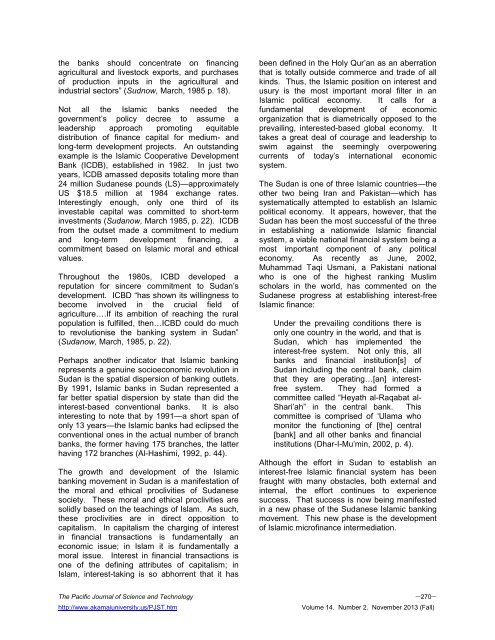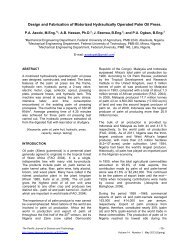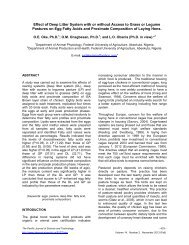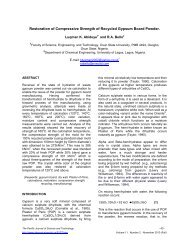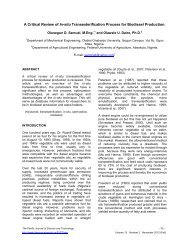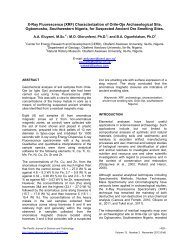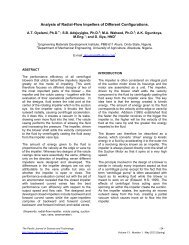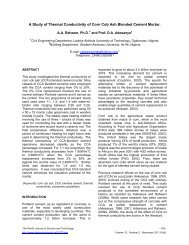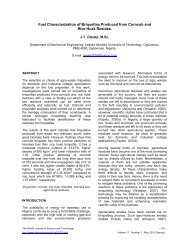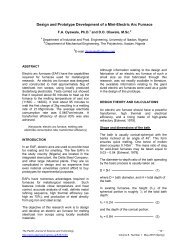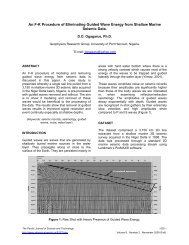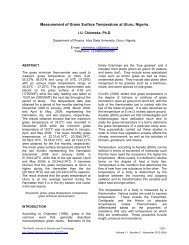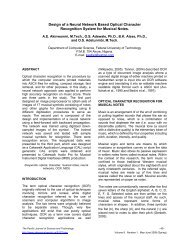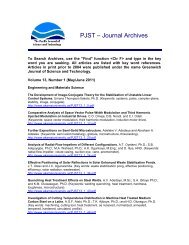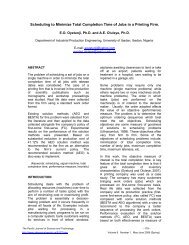Islamic Banking in Sudan: A Case Study of the ... - Akamai University
Islamic Banking in Sudan: A Case Study of the ... - Akamai University
Islamic Banking in Sudan: A Case Study of the ... - Akamai University
Create successful ePaper yourself
Turn your PDF publications into a flip-book with our unique Google optimized e-Paper software.
<strong>the</strong> banks should concentrate on f<strong>in</strong>anc<strong>in</strong>g<br />
agricultural and livestock exports, and purchases<br />
<strong>of</strong> production <strong>in</strong>puts <strong>in</strong> <strong>the</strong> agricultural and<br />
<strong>in</strong>dustrial sectors” (Sudnow, March, 1985 p. 18).<br />
Not all <strong>the</strong> <strong>Islamic</strong> banks needed <strong>the</strong><br />
government’s policy decree to assume a<br />
leadership approach promot<strong>in</strong>g equitable<br />
distribution <strong>of</strong> f<strong>in</strong>ance capital for medium- and<br />
long-term development projects. An outstand<strong>in</strong>g<br />
example is <strong>the</strong> <strong>Islamic</strong> Cooperative Development<br />
Bank (ICDB), established <strong>in</strong> 1982. In just two<br />
years, ICDB amassed deposits total<strong>in</strong>g more than<br />
24 million <strong>Sudan</strong>ese pounds (LS)—approximately<br />
US $18.5 million at 1984 exchange rates.<br />
Interest<strong>in</strong>gly enough, only one third <strong>of</strong> its<br />
<strong>in</strong>vestable capital was committed to short-term<br />
<strong>in</strong>vestments (<strong>Sudan</strong>ow, March 1985, p. 22). ICDB<br />
from <strong>the</strong> outset made a commitment to medium<br />
and long-term development f<strong>in</strong>anc<strong>in</strong>g, a<br />
commitment based on <strong>Islamic</strong> moral and ethical<br />
values.<br />
Throughout <strong>the</strong> 1980s, ICBD developed a<br />
reputation for s<strong>in</strong>cere commitment to <strong>Sudan</strong>’s<br />
development. ICBD “has shown its will<strong>in</strong>gness to<br />
become <strong>in</strong>volved <strong>in</strong> <strong>the</strong> crucial field <strong>of</strong><br />
agriculture….If its ambition <strong>of</strong> reach<strong>in</strong>g <strong>the</strong> rural<br />
population is fulfilled, <strong>the</strong>n…ICBD could do much<br />
to revolutionise <strong>the</strong> bank<strong>in</strong>g system <strong>in</strong> <strong>Sudan</strong>”<br />
(<strong>Sudan</strong>ow, March, 1985, p. 22).<br />
Perhaps ano<strong>the</strong>r <strong>in</strong>dicator that <strong>Islamic</strong> bank<strong>in</strong>g<br />
represents a genu<strong>in</strong>e socioeconomic revolution <strong>in</strong><br />
<strong>Sudan</strong> is <strong>the</strong> spatial dispersion <strong>of</strong> bank<strong>in</strong>g outlets.<br />
By 1991, <strong>Islamic</strong> banks <strong>in</strong> <strong>Sudan</strong> represented a<br />
far better spatial dispersion by state than did <strong>the</strong><br />
<strong>in</strong>terest-based conventional banks. It is also<br />
<strong>in</strong>terest<strong>in</strong>g to note that by 1991—a short span <strong>of</strong><br />
only 13 years—<strong>the</strong> <strong>Islamic</strong> banks had eclipsed <strong>the</strong><br />
conventional ones <strong>in</strong> <strong>the</strong> actual number <strong>of</strong> branch<br />
banks, <strong>the</strong> former hav<strong>in</strong>g 175 branches, <strong>the</strong> latter<br />
hav<strong>in</strong>g 172 branches (Al-Hashimi, 1992, p. 44).<br />
The growth and development <strong>of</strong> <strong>the</strong> <strong>Islamic</strong><br />
bank<strong>in</strong>g movement <strong>in</strong> <strong>Sudan</strong> is a manifestation <strong>of</strong><br />
<strong>the</strong> moral and ethical proclivities <strong>of</strong> <strong>Sudan</strong>ese<br />
society. These moral and ethical proclivities are<br />
solidly based on <strong>the</strong> teach<strong>in</strong>gs <strong>of</strong> Islam. As such,<br />
<strong>the</strong>se proclivities are <strong>in</strong> direct opposition to<br />
capitalism. In capitalism <strong>the</strong> charg<strong>in</strong>g <strong>of</strong> <strong>in</strong>terest<br />
<strong>in</strong> f<strong>in</strong>ancial transactions is fundamentally an<br />
economic issue; <strong>in</strong> Islam it is fundamentally a<br />
moral issue. Interest <strong>in</strong> f<strong>in</strong>ancial transactions is<br />
one <strong>of</strong> <strong>the</strong> def<strong>in</strong><strong>in</strong>g attributes <strong>of</strong> capitalism; <strong>in</strong><br />
Islam, <strong>in</strong>terest-tak<strong>in</strong>g is so abhorrent that it has<br />
been def<strong>in</strong>ed <strong>in</strong> <strong>the</strong> Holy Qur’an as an aberration<br />
that is totally outside commerce and trade <strong>of</strong> all<br />
k<strong>in</strong>ds. Thus, <strong>the</strong> <strong>Islamic</strong> position on <strong>in</strong>terest and<br />
usury is <strong>the</strong> most important moral filter <strong>in</strong> an<br />
<strong>Islamic</strong> political economy. It calls for a<br />
fundamental development <strong>of</strong> economic<br />
organization that is diametrically opposed to <strong>the</strong><br />
prevail<strong>in</strong>g, <strong>in</strong>terested-based global economy. It<br />
takes a great deal <strong>of</strong> courage and leadership to<br />
swim aga<strong>in</strong>st <strong>the</strong> seem<strong>in</strong>gly overpower<strong>in</strong>g<br />
currents <strong>of</strong> today’s <strong>in</strong>ternational economic<br />
system.<br />
The <strong>Sudan</strong> is one <strong>of</strong> three <strong>Islamic</strong> countries—<strong>the</strong><br />
o<strong>the</strong>r two be<strong>in</strong>g Iran and Pakistan—which has<br />
systematically attempted to establish an <strong>Islamic</strong><br />
political economy. It appears, however, that <strong>the</strong><br />
<strong>Sudan</strong> has been <strong>the</strong> most successful <strong>of</strong> <strong>the</strong> three<br />
<strong>in</strong> establish<strong>in</strong>g a nationwide <strong>Islamic</strong> f<strong>in</strong>ancial<br />
system, a viable national f<strong>in</strong>ancial system be<strong>in</strong>g a<br />
most important component <strong>of</strong> any political<br />
economy. As recently as June, 2002,<br />
Muhammad Taqi Usmani, a Pakistani national<br />
who is one <strong>of</strong> <strong>the</strong> highest rank<strong>in</strong>g Muslim<br />
scholars <strong>in</strong> <strong>the</strong> world, has commented on <strong>the</strong><br />
<strong>Sudan</strong>ese progress at establish<strong>in</strong>g <strong>in</strong>terest-free<br />
<strong>Islamic</strong> f<strong>in</strong>ance:<br />
Under <strong>the</strong> prevail<strong>in</strong>g conditions <strong>the</strong>re is<br />
only one country <strong>in</strong> <strong>the</strong> world, and that is<br />
<strong>Sudan</strong>, which has implemented <strong>the</strong><br />
<strong>in</strong>terest-free system. Not only this, all<br />
banks and f<strong>in</strong>ancial <strong>in</strong>stitution[s] <strong>of</strong><br />
<strong>Sudan</strong> <strong>in</strong>clud<strong>in</strong>g <strong>the</strong> central bank, claim<br />
that <strong>the</strong>y are operat<strong>in</strong>g…[an] <strong>in</strong>terestfree<br />
system. They had formed a<br />
committee called “Heyath al-Raqabat al-<br />
Shari’ah” <strong>in</strong> <strong>the</strong> central bank. This<br />
committee is comprised <strong>of</strong> ‘Ulama who<br />
monitor <strong>the</strong> function<strong>in</strong>g <strong>of</strong> [<strong>the</strong>] central<br />
[bank] and all o<strong>the</strong>r banks and f<strong>in</strong>ancial<br />
<strong>in</strong>stitutions (Dhar-I-Mu’m<strong>in</strong>, 2002, p. 4).<br />
Although <strong>the</strong> effort <strong>in</strong> <strong>Sudan</strong> to establish an<br />
<strong>in</strong>terest-free <strong>Islamic</strong> f<strong>in</strong>ancial system has been<br />
fraught with many obstacles, both external and<br />
<strong>in</strong>ternal, <strong>the</strong> effort cont<strong>in</strong>ues to experience<br />
success. That success is now be<strong>in</strong>g manifested<br />
<strong>in</strong> a new phase <strong>of</strong> <strong>the</strong> <strong>Sudan</strong>ese <strong>Islamic</strong> bank<strong>in</strong>g<br />
movement. This new phase is <strong>the</strong> development<br />
<strong>of</strong> <strong>Islamic</strong> micr<strong>of</strong><strong>in</strong>ance <strong>in</strong>termediation.<br />
The Pacific Journal <strong>of</strong> Science and Technology –270–<br />
http://www.akamaiuniversity.us/PJST.htm<br />
Volume 14. Number 2. November 2013 (Fall)


